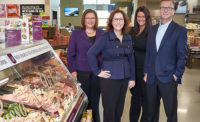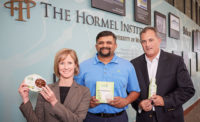Cover Story
Hormel and Applegate: Gateway to greatness
Hormel Foods and Applegate look to build off each other’s strengths to propel their products further in the marketplace.

Neil Leinwand and Kerry Collins of Applegate join Tom Day of Hormel Foods in the Austin, Minn., headquarters.

Hormel Natural Choice Oven Roasted Deli Turkey


Tom Day, group vice president, Refrigerated Foods, for Hormel Foods




In recent years, Hormel Foods has been on the prowl, busy acquiring companies and products as the economic headwinds have eased and sparked growth in the M&A space.
The Austin, Minn.-based protein and food processor has added several brands and product lines to its portfolio, including Skippy peanut butter and Muscle Milk beverages — two interesting bolt-ons to what was more of a traditional animal-protein and prepared/refrigerated foods powerhouse. This year, Hormel Foods set its sights on a company more in line with its animal-protein roots, and announced the acquisition of Bridgewater, N.J., natural and organic meat trailblazer Applegate Farms in late May. The deal officially closed on July 13, 2015, and in many ways immediately opened new frontiers for both businesses.
Exclusive video Q&A
Editor-in-chief Andy Hanacek sat down with Tom Day of Hormel Foods to discuss the company’s plans for its 125th anniversary. |
“[Acquiring Applegate] has to do with the idea of giving consumers choices, and when we looked at our portfolio today, even though we compete in a lot of different protein areas, Applegate fills an area that clearly was lacking in our portfolio,” explains Tom Day, group vice president, Refrigerated Foods, for Hormel Foods. “We looked at where the future and consumers are headed, and we thought we needed to add [organic meat products] to our portfolio.”
Of course, anyone familiar with Hormel Foods’ product launches in the last decade knows all about the company’s Natural Choice line, its success and expansion. Both Hormel Foods and Applegate believe that the product lines can coexist easily post-acquisition. Neil Leinwand, senior vice president, Marketing, for Applegate, says the products reach different consumers in the marketplace.
“From both a qualitative and a quantitative perspective, these are different consumers looking for different things,” he says. “Our consumers are passionate about not using antibiotics in raising animals, our humane standards, and the fact that we don’t use GMO ingredients.
“Having said that, there is a path of awareness that consumers go through as they become more and more enlightened around natural and organic meat, so it could happen that consumers will progress from one to the next,” Leinwand adds. “But today they’re very different consumers, making this is an incremental opportunity for both companies.”
Day agrees and explains further the differences between Natural Choice and Applegate brands.
“We’ve removed a lot of the preservatives [in the Natural Choice product], but it’s in a different swim lane than the Applegate product,” Day says. “It’s great to be able to expand the portfolio without a direct overlap, as Applegate and Natural Choice products appeal to two different types of customers.”
The desire for a coexistence of Natural Choice with the Applegate Natural and Organic brands is a clear signal as to how Hormel Foods plans to approach the transition, which had only been two months in the making during The National Provisioner’s visit to Austin for this story. According to Kerry Collins, CEO of Applegate, early decisions and directives have been very accepting of the unique differences between Hormel Foods and Applegate.
“There has been a great respect for the consumer segment that we support, an appreciation for the differentiated product that we bring, and a real intent to allow this business to continue to flourish,” she explains. “Meanwhile, we still have the advantages that being part of a larger organization can provide in terms of tool sets and scaling opportunities, and R&D assets that weren’t necessarily built up or as significant in the Applegate company.”
Hormel Foods, for its part, planned for this type of approach from the beginning, Day relays.
“Applegate will continue to be a self-supporting organization,” he says. “I think, ultimately, we will respect the mission of Applegate, which is to change the meat we eat — honoring that mission and doing everything we can to move that mission forward.”
Leinwand believes the capabilities that Hormel Foods possesses from a technology, R&D and pilot-plant perspective will be “a tremendous help” to Applegate as well. Communicating the positives of the news to Applegate’s loyal consumer base was one of the initial challenges that the company’s marketing team needed to face head-on. Collins gives credit to the Applegate digital team — a group that stands as a fine example for the industry in terms of social-media and digital marketing of a meat brand — for its approach.
“We anticipated there would be some negative chatter in social media, and Neil and the marketing team did a great job, very transparently and truthfully responding to any kind of consumer response,” Collins says. “We asked them to give us a chance, see our actions and gain the confidence that Applegate would remain Applegate.
“We’re not the first natural/organic [food] company to be acquired by a larger food corporation,” she adds. “Yet I think consumers are also starting to appreciate and understand that, for a company like Applegate to continue to grow, the infrastructure and scale of a larger company is necessary.”
Leinwand explains the team adopted a three-pronged approach to the messaging, the first being that Applegate would still be the Applegate that its consumers knew and loved.
“Our consumers are very passionate on issues like non-therapeutic use of antibiotics, GMOs, labeling and using GMO-free ingredients,” Leinwand says. “So the first message was that nothing is changing to our supply chain, and the mission to change the meat we eat is going to continue forward.”
Second, Applegate’s mission would progress, and it would maintain its leadership approach and advocacy position on issues that change the meat products supplied to the marketplace — a position of pride for Applegate’s leadership, workforce and consumer base.
“Hormel Foods has been very respectful of that and understands that is what our consumers value,” Leinwand explains. “Conversely, we believe we have an opportunity to bring that same passion and leadership to Hormel Foods.”
Lastly, the marketing team explained to consumers the acquisition provides a huge opportunity to expand Applegate’s distribution.
“If you’re increasing our size and scale, that means you have more family farms raising animals the way that we believe they should be raised, without antibiotics,” he says. “So the partnership offers the potential to take our natural and organic offerings to a wider range of consumers in many more stores and foodservice operations.”
Leinwand says the partnership will help scale Applegate’s model of antibiotic-free, humanely raised agriculture in an accelerated fashion. Furthermore, Collins says the access to additional markets and customers will allow for faster spread of Applegate’s message and mission.
“This is an opportunity to be a larger influence in the meat industry than we could have been alone, and to drive change further and faster, across more channels than we’ve been capable of doing on our own,” she says.
As Applegate relayed the message to its loyal consumers, Hormel Foods executed its plan to put Applegate’s employees at ease about their own future. Transitions can be challenging, and Day says the executive team tried to put themselves in the shoes of the Applegate workforce, traveling to Bridgewater to meet employees in person the day after the announcement was made.
“We asked them to please look back at our track record with regard to how we handled past acquisitions,” he says. “And an analogy I used was, ‘This is sort of like dancing: The reality is, the music’s going to change, and I may step on your toe, but it’s not because I want to; it’s just because the music’s changed. As a result of the music change, we have to stop and talk to each other [to avoid more missteps].’”
Leinwand and Collins both agree that the message resonated with employees and allowed them to feel a bit more at ease about the future after meeting Hormel Foods’ leadership.
“Having leaders like Tom and [Hormel Foods chairman/CEO Jeff Ettinger] come out, meet with our team, and let it be known there’d be no changes to our office, employees, products, positions, standards or mission went a long way to building understanding and trust, and I think that clarity has allowed everybody to get very excited, optimistic and positive about how we can come together,” Leinwand says. Getting the “dance steps” figured out early on, he adds, has allowed “Applegaters” to see the similarities that exist between Applegate and Hormel Foods.
“Applegate is a company that stands for three things: Taste, Truth and Transformation,” Leinwand says. “From a Taste perspective, quality is No. 1 with Hormel Foods, and you see that in everything that they’re doing. On Truth, we believe in genuine, direct communication, and every dialogue that we’ve had with Hormel Foods, it’s clear that this is a very consistent approach and culture that the organization in Austin has as well. Finally, on Transformation, we’re transforming different things, but [we both believe] we’re looking forward and driving progress.”
Collins believes Hormel Foods’ open recognition and acceptance of the differences between the two businesses has gone a very long way toward making the future bright for the partnership.
“Driving change means that forward visibility is not always as crystal clear as it may be in a more asset-based company, and I think Hormel Foods has taken a lot of time to appreciate and understand that, when you’re driving change, you’re in transition all the time, continuing to source and add farms and grow,” she explains. “Stability is not as crystal clear as it may be in a large organization like Hormel Foods, which is more formally developed and has a large asset base off which to build. When you’re [driving change like Applegate is], you don’t always have every answer in front of you every day, and I think Hormel Foods has embraced that and appreciated it about Applegate.”
As Day explains it, Hormel Foods knew where it wanted to go in terms of filling needs, and there’s little doubt the company saw how well Applegate’s differences fit during due diligence.
“When we looked at Applegate and the trust and affinity that the team has built over their 27 years of work with consumers, it was the fastest way for us to get into [the natural and organic] space,” Day says. “I’ve said before: Applegate swims a little bit against the current, and the reality of it is, we have to respect that and understand it so that we can meet the needs of those consumers.”
Given the track record Hormel Foods has posted on acquisitions over the years, phasing the Applegate business into the corporation without disturbing its success ought to continue down a smooth road — which is exactly what Hormel Foods’ leadership would like to see.
“As great a company as Applegate is, and as robust as its results have been,” Day concludes, “the future is even brighter with regard to what we can do together, as long as, again, we let Applegate be Applegate, support it and not get in the way.” NP
Looking for a reprint of this article?
From high-res PDFs to custom plaques, order your copy today!









